AI was all the rage. Now it’s just part of the rage. The bigger source of excitement in 2025 is agentic AI. With its model context protocols (MCP), agent2agent protocols (A2A), and ability to do, not just say, it might just be a significant improvement for how we interact with the internet, computers, and each other.
Customers today expect instant, personalized support, and they love it when companies truly get them. Customer experience now matters as much as the product.
Remember when Amazon first introduced its AI-driven “people who bought this, also bought” product-recommendation feature? All other ecommerce brands soon started using the feature to stay competitive.
The same thing is now happening with agentic AI.
Implement agentic AI the right way with Tidio’s Lyro!
What is agentic AI?
Agentic AI is a type of artificial intelligence that can act on its own without human control to achieve goals, make decisions, and adapt to its environment. Unlike passive tools like traditional chatbots, agentic AI operates with a degree of independence, pursuing objectives with minimal human intervention.
An AI agent is a self-steering program that follows general instructions but interacts with its environment on its own. For example, Lyro, Tidio’s AI agent, can check order statuses and respond with the details without waiting for a human to look this information up.
Agentic AI vs generative AI
The difference between agentic AI and generative AI is about the ability of the former to make decisions, take action, and not just create responses. It’s about agency vs generation. It’s the difference between “I checked the status of your order, it should arrive tomorrow” and “I’m sorry, I don’t have any details about this”.
(In a more dystopian example, it’s HAL refusing to open the pod bay doors rather than just saying he doesn’t know how.)
In fact, Gartner predicts that, by 2029, agentic AI will autonomously resolve 80% of common customer service issues without human intervention, leading to a 30% reduction in operational costs.
Traditional AI is your typical scripted chatbot, great as FAQ chatbots, but narrow and can’t really handle complex problems. Generative AI can create content, but doesn’t know what to do with it unless told.
Agentic AI companies build solutions that combine intelligence with action. It doesn’t just suggest a solution; it applies it. The best AI agents aren’t about smarter answers, they’re about smarter decisions.
Here’s a simple comparison:
| Feature | Traditional AI | Generative AI | Agentic AI |
| Behavior | Rule-based, reactive | Creative, generates content | Goal-driven, plans, and executes |
| Autonomy | Low | Medium | High |
| Memory & Context | Minimal | Short-term, session-based | Long-term, persistent across interactions |
| Learning Style | Pre-programmed updates | Trained on large datasets | Continuous feedback and adjustment |
| Customer Service Example | FAQ bots, scripted IVRs | Email drafting, auto-responses | Full problem-solving, proactive customer recovery |
How AI agents work
Traditional AI systems react to input. They wait for a customer to ask a question or report a problem. Agentic AI doesn’t wait. It predicts, plans, and acts autonomously, guided by a goal, not just a trigger.
Best AI agents take in information, plan actions, make decisions, and adjust based on outcomes. No constant human prompting needed.
Key characteristics of agentic AI:
- Goal-oriented: Every action taken is in service of achieving a specific outcome.
- Autonomous: The system doesn’t need humans to constantly intervene.
- Adaptive: It can revise its plans based on new information.
- Continuous: It doesn’t just complete a single task; it manages full workflows.
Imagine you run an online electronics store. A traditional chatbot waits for customers to ask a basic question like, “Do you do same-day delivery?” and then provides simple answers or offers several generated response options.
AI agents, on the other hand, can enable more elaborate human-like conversational customer service and provide more accurate answers tailored to specific contexts.
A more advanced agentic AI architecture and systems monitor order statuses, detect delays, and proactively notify customers. It can also offer discounts and trigger escalations, with most of these actions done automatically.
For example, Tidio’s Lyro AI agent can even perform upsells and catch leads:
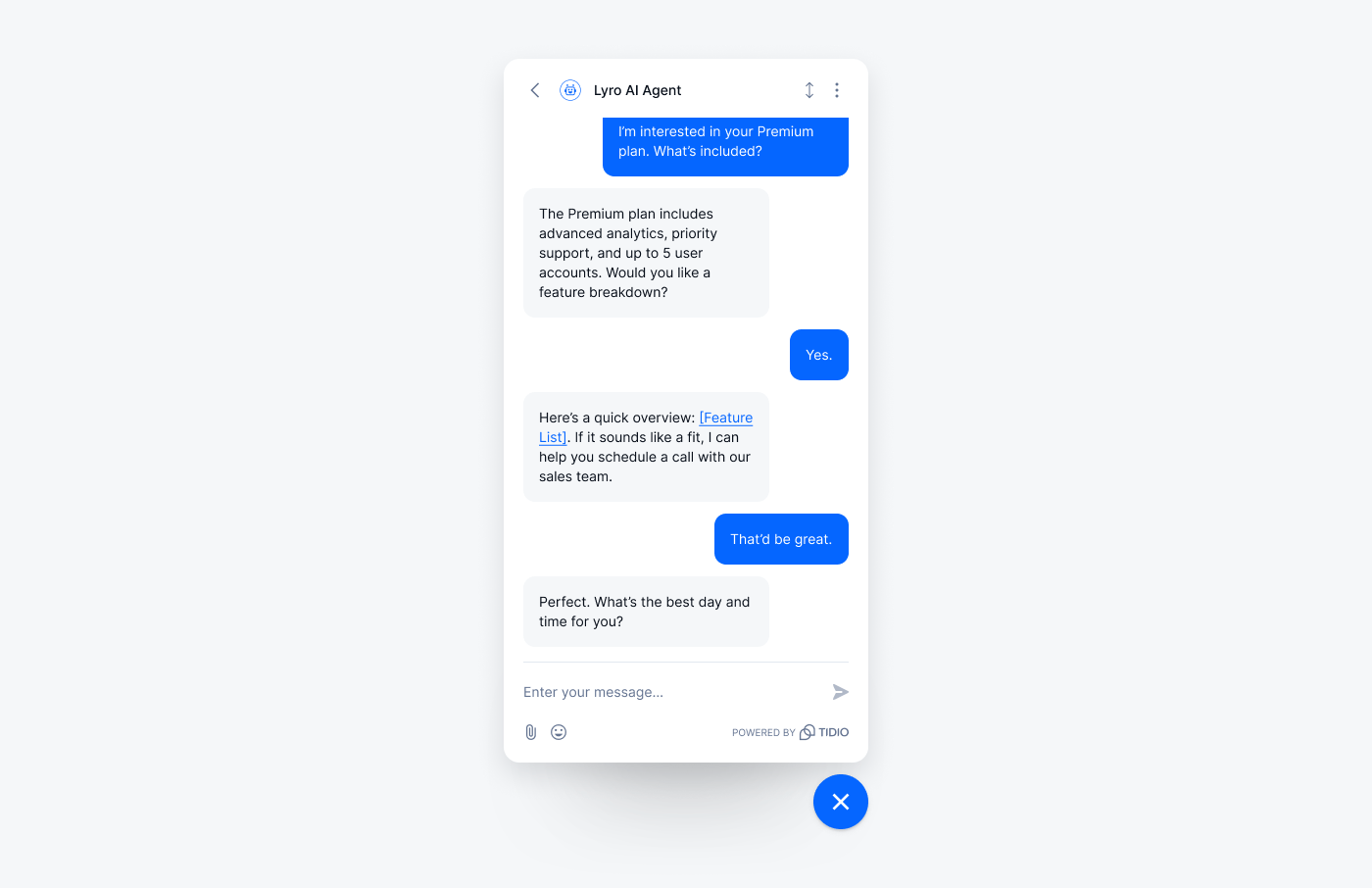
Agentic AI companies provide omnichannel customer service solutions that can:
- Provide accurate answers, as it uses the data from your knowledge base (like knowledge base chatbots)
- Offer solutions before customers even realize there’s a problem
- Provide multichannel customer service and seamlessly personalize interactions across multiple touchpoints, such as chat, email, SMS, WhatsApp automation, etc.
For example, one A-list streaming service brand uses agentic AI solutions to automate high volumes of customer requests:
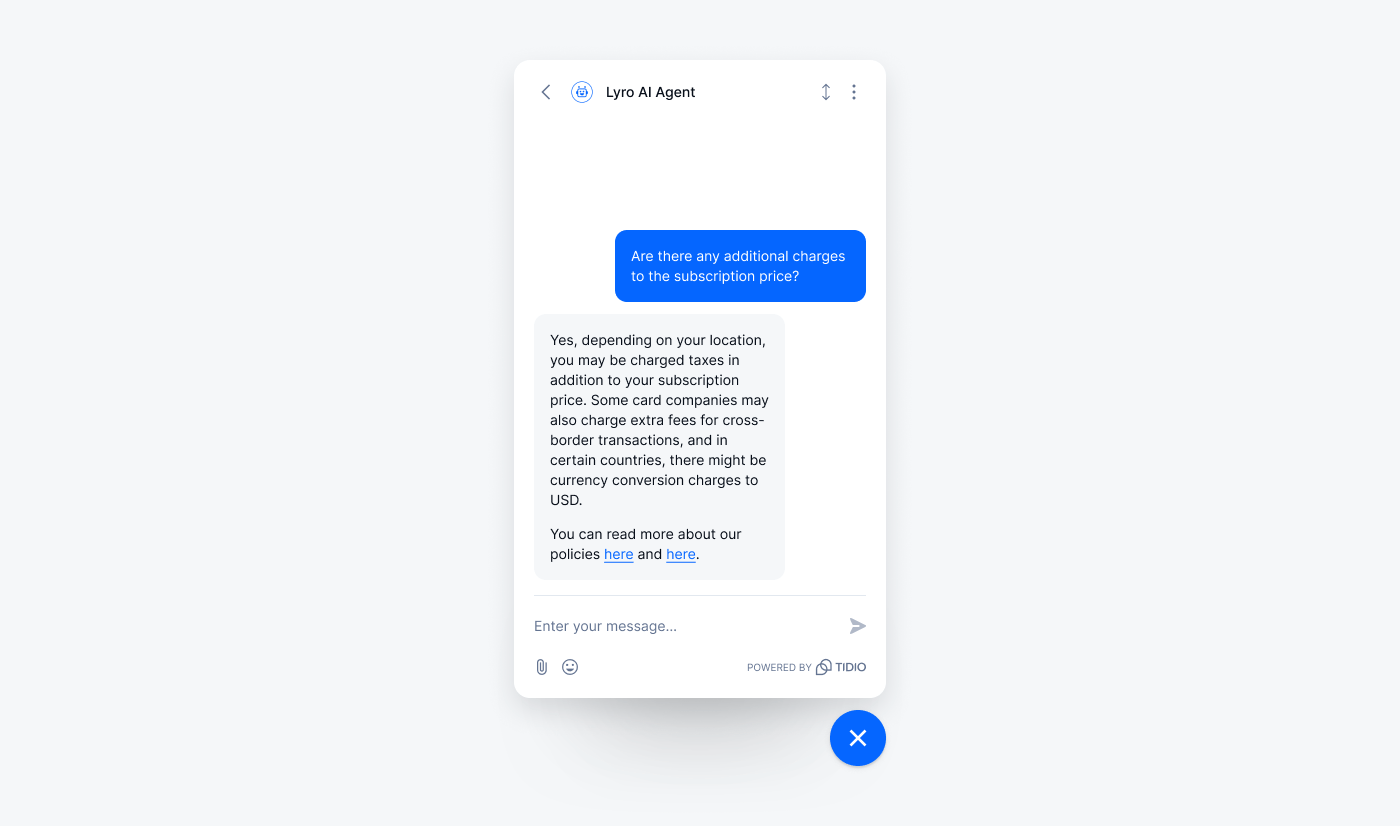
Key components of an agentic AI system (with examples)
Agentic AI architecture is designed to act on its own to solve problems. They can make decisions and take steps without needing constant human input. They are the core that makes systems like Tidio’s Lyro work so well.
1. Understanding customer needs: gathering input
Agentic AI starts by listening carefully to customer inquiries through your chat widget. It reads incoming messages in real-time, capturing the intent and urgency behind each question.
Example: A customer types in asking about a late delivery. Lyro immediately recognizes the topic and prepares a relevant response without waiting for human intervention.
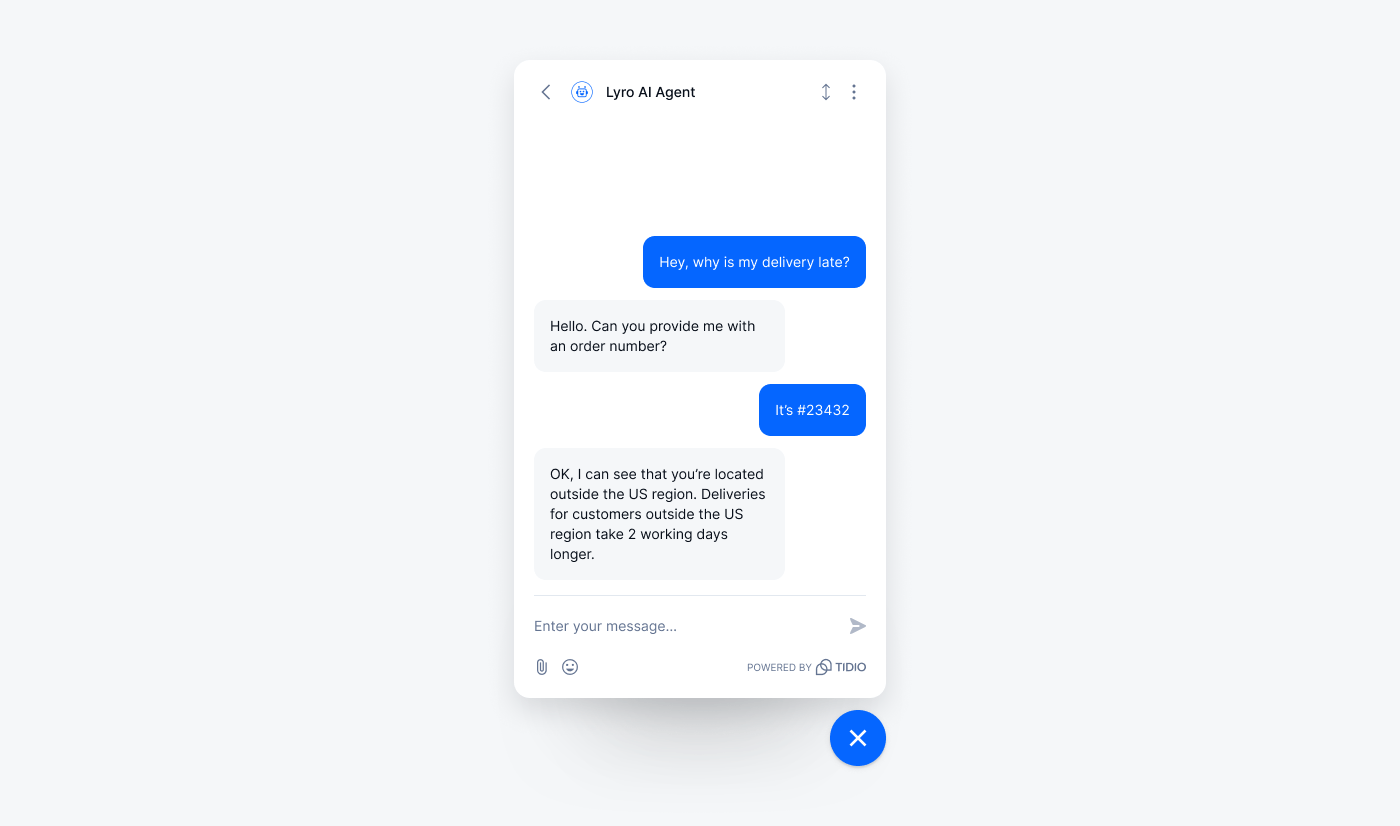
2. Finding the best response: strategy selection
Once the message is understood, the AI chooses the best approach from your knowledge base to resolve the issue quickly. If it can’t find a confident answer, it hands the conversation off to a live agent.
Example: A shopper struggling to reset their password is instantly guided by Lyro through step-by-step instructions pulled from your help articles. This saves the customer a wait in a support queue.
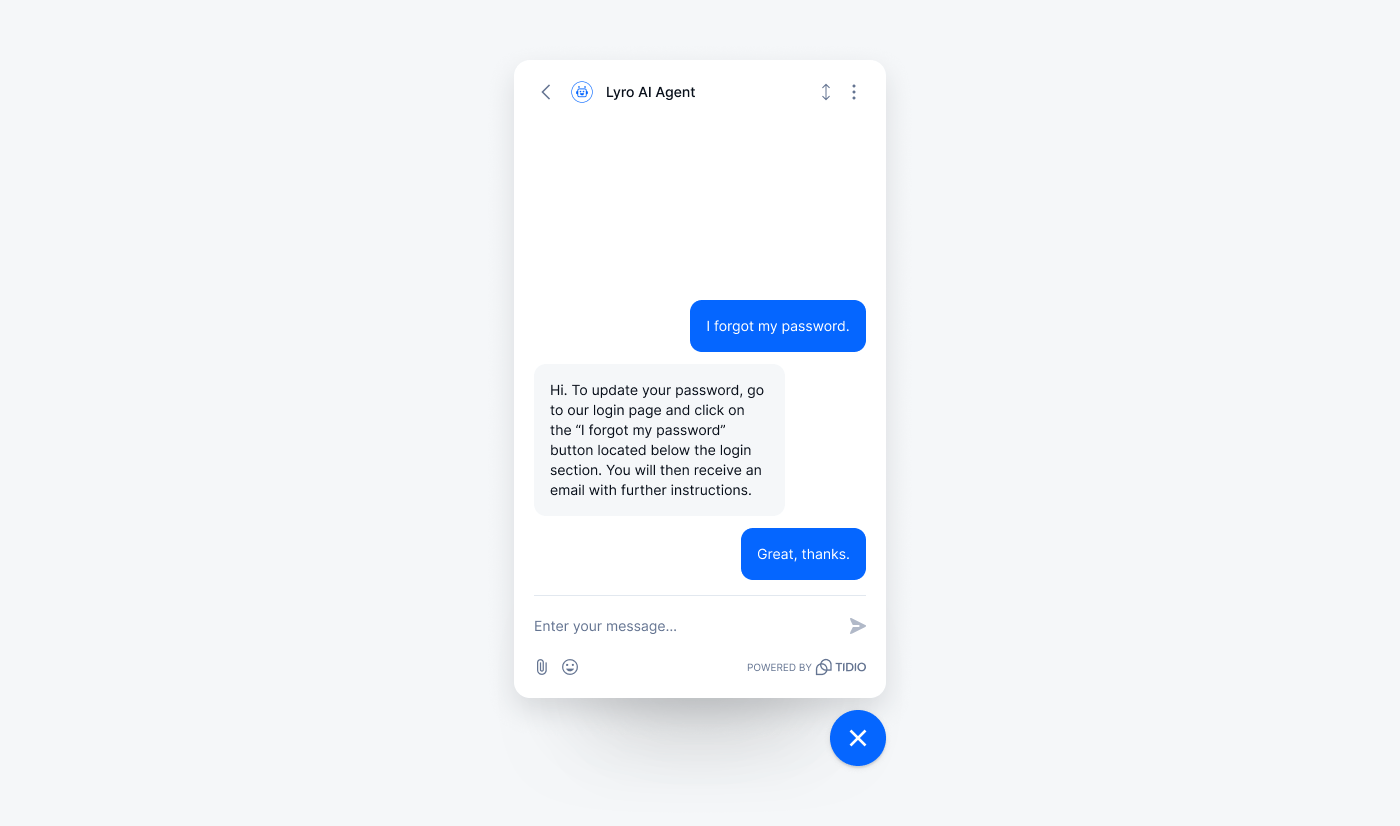
3. Remembering the conversation: context preservation
The AI customer service agent keeps track of the entire conversation context during the chat session. This way, it can handle multi-step questions naturally, without forcing customers to repeat themselves.
Example: A customer first asks about shipping costs and then about delivery times. Lyro smoothly follows the thread, maintaining the context across multiple related questions.
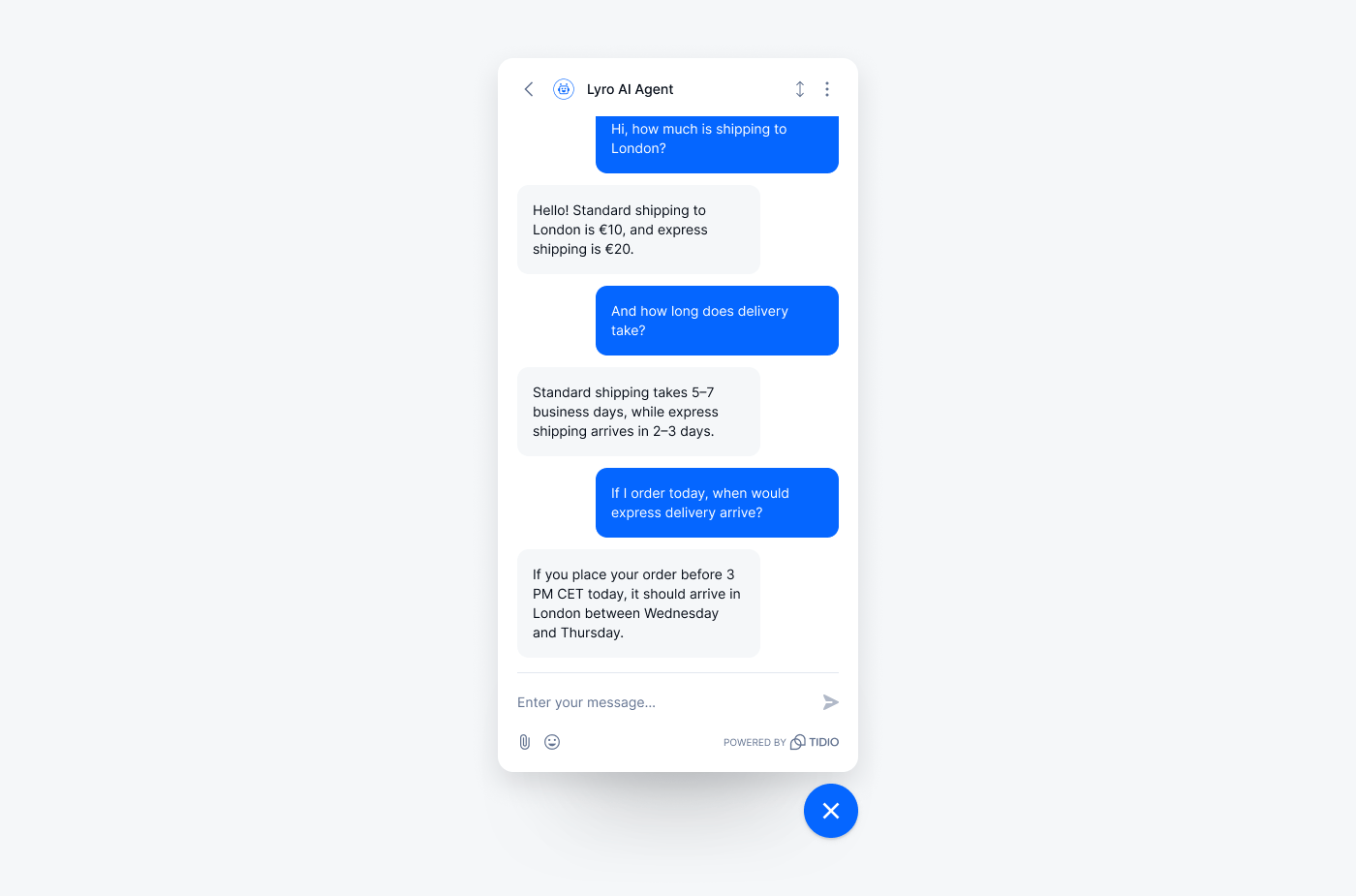
4. Acting instantly: executing help actions
Rather than just offering suggestions, agentic AI takes real action by delivering complete answers pulled from your FAQ or knowledge base, solving issues directly in the chat.
Example: When a visitor asks, “How do I cancel my subscription?”, Lyro immediately provides a clear, step-by-step guide, with no need to escalate unless the user requests it. And it can be trained to use specific emotions and language while doing so.
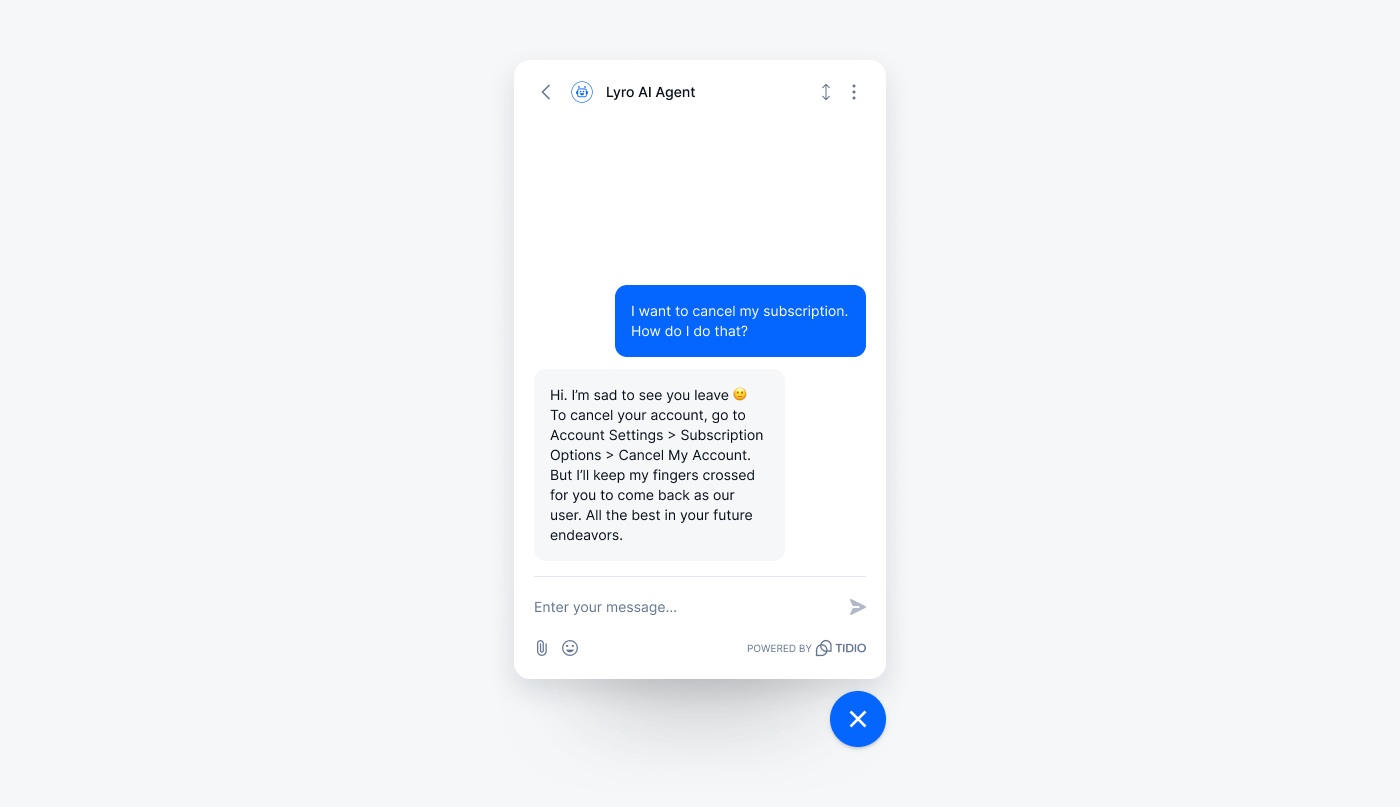
5. Improving over time: learning from conversations
Agentic AI continuously analyzes conversations to spot gaps where new help articles or updates are needed. This helps your team refine the support content and keep the AI’s answers accurate.
Example: If Lyro notices repeated questions that don’t have strong existing answers, it flags these for your team to improve, making future customer interactions even smoother.
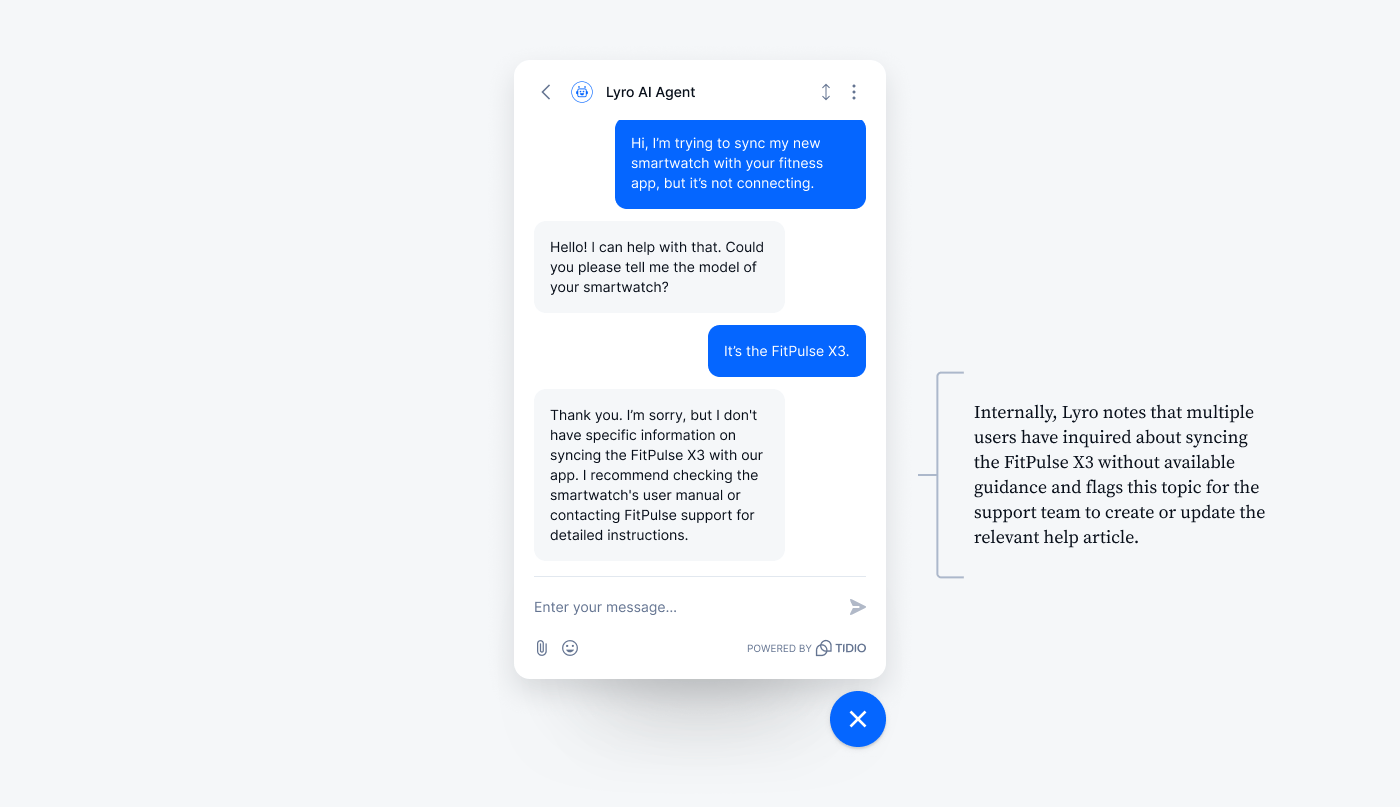
Read more: Learn the steps on how to implement agentic customer service.
Industries that benefit from AI applications
By now, we’re pretty much all aware of how much AI is changing the way businesses work. While all industries gain from AI, some see much bigger benefits than others. These sectors are growing faster, saving more time and money, and making better decisions thanks to smart AI tools.
Did you know that…
More than 33% of enterprise software applications will incorporate agentic AI by 2028, up from less than 1% in 2024.
Ecommerce: automated lead generation and sales boosts
Agentic AI isn’t just for answering questions, it can directly improve your revenue.
With customer support and customer success automation, AI can:
- Instantly respond to product questions to remove purchase hesitation
- Handle common issues like order tracking and returns without agent intervention
- Engage visitors who seem stuck, encouraging them to complete purchases
Example: A shopper at an online shoe store asks about sizing. Lyro instantly answers, then offers a discount code when the visitor seems hesitant to check out.
Result: Higher conversion rates and real-time sales, lower cart abandonment.
SaaS: faster support, happier users
For SaaS platforms, quick, clear help is critical to keeping users active and satisfied.
AI-powered SaaS help desk automation enables:
- Instant answers to technical or billing questions
- Guiding users to helpful resources without needing a support ticket
- Freeing up human agents to focus on complex cases
Example: A new project management app user gets confused about plan limits. Lyro steps in with a helpful, human-like response and links to an FAQ article. This way it resolves the question before it escalates.
Result: Fewer support tickets and faster onboarding.
Read more: Learn what AI experts and industry leaders say about integrating ticketing into a CS Stack
Travel & hospitality: real-time service when it matters most
Travelers expect fast, reliable support. AI can meet those expectations by:
- Instantly answering FAQs about bookings, cancellations, or amenities
- Proactively helping guests reschedule or find alternatives if plans change
- Ensuring 24/7 support availability without growing support teams
Example: A hotel guest uses the chat widget late at night to ask about a late checkout. Lyro responds immediately with the hotel’s policy and offers a simple request form to extend the stay.
Result: Higher guest satisfaction and reduced front desk workload.
Finance & retail services: trustworthy, always-on help
When customers have money-related questions, fast and accurate support builds trust. AI-driven support automation can:
- Provide quick answers about account access, payments, or refunds
- Guide customers through basic troubleshooting or documentation
- Keep customers engaged while protecting sensitive information
Example: A customer wonders why their payment didn’t go through. Lyro can instantly act like a banking chatbot and provide common troubleshooting steps and offer to escalate from AI to human if needed, reducing frustration and delays.
Result: Improved customer loyalty and faster issue resolution.
Read more: Discover how fintech AI agents are improving the industry’s customer support
Gaming: AI agents as human-like characters
AI agents in gaming are gaining traction for making NPCs act more human. Gaming AI agents use behavioral scripts, adjust to player actions in real time, and navigate the game world with smart pathfinding. It’s a glimpse into how AI can bring dynamic, lifelike interactions to virtual environments.
Example: In Stanford’s game AI Village, 25 agents live in a virtual town, interact with each other, form relationships, and plan activities, like characters in The Sims, but powered by AI.
Result: Better and more immersive gameplay experience.
Did you know that…
Gartner’s 2025 Emerging Tech Report claims that over 60% of enterprise AI rollouts embed agentic architectures.
5 Top agentic AI applications
There are numerous agentic AI applications available on the market, each offering a different set of features and benefits. Businesses often find it daunting to choose the right one for their unique sets of needs. With that in mind, here are descriptions, key AI features, and pricing comparisons of the top five picks:
| Tool | Rating | Free plan | Best for |
| Tidio | 4.7/5 ⭐️ | ✅ | Lyro AI agent and AI chatbots for customer service automation |
| Ada | 4.6/5 ⭐️ | Free trial | Best for enterprise-grade AI support |
| Intercom Fin | 4.6/5 ⭐️ | Free trial | Best for product-led companies |
| Forethought | 4.3/5 ⭐️ | Free trial | Best for AI-first issue resolution |
| Kore.ai | 4.7/5 ⭐️ | Free trial | Best for custom AI agents across channels |
1. Tidio
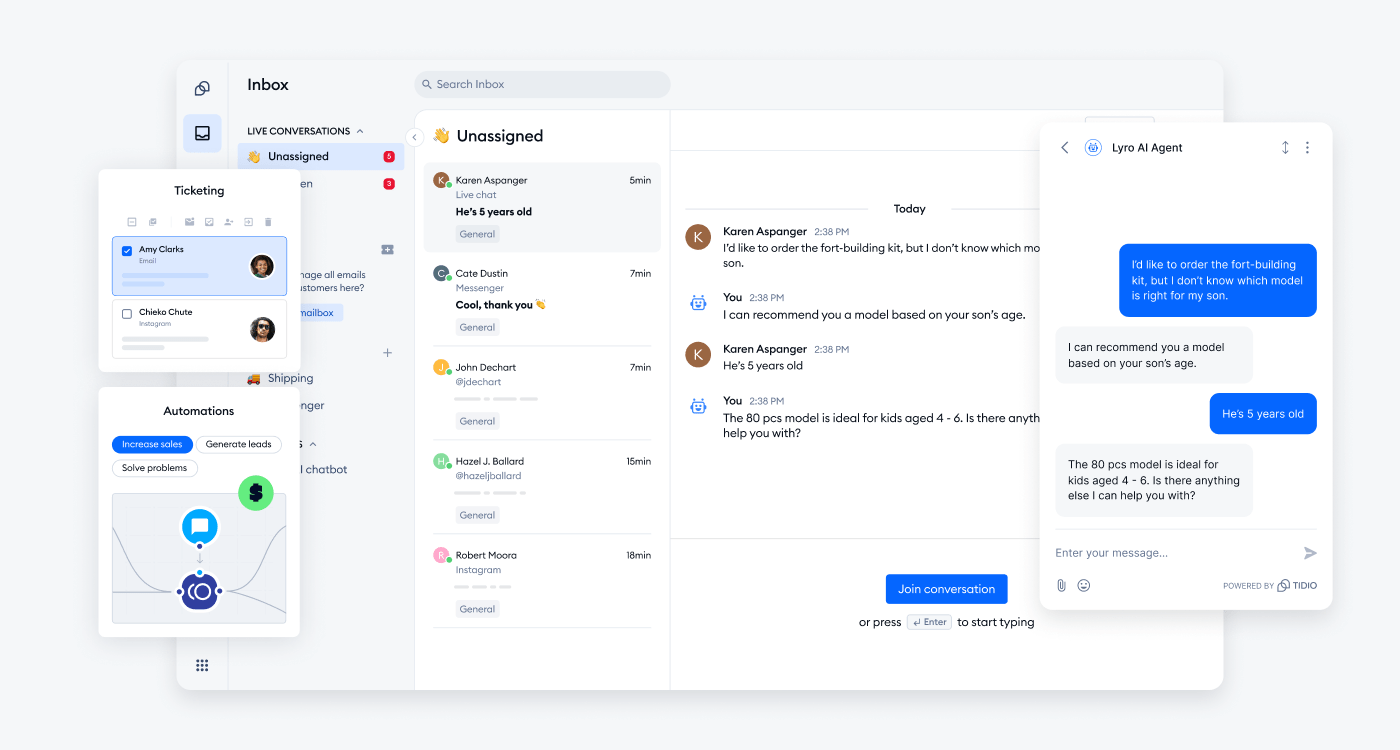
Rating: 4.7/5 ⭐️ (1,650+ G2 reviews)
Tidio is a customer service platform designed specifically for small to medium-sized businesses (SMBs). It helps them leverage AI-driven, conversational customer service without heavy technical overhead. Its agentic AI blends chatbot automation with human handover, ensuring that customer interactions stay fluid and natural, improving customer retention.
Tidio’s lightweight setup and affordable pricing make it an attractive entry point for businesses looking to adopt an easy-to-integrate AI-powered service. Tidio stands out by providing a seamless way to automate FAQs, guide customers through product selections, and even handle basic troubleshooting.
It’s particularly strong for ecommerce automation, offering easy integrations with platforms like Shopify, Wix, and WordPress. For SMBs that need rapid deployment and measurable impact on customer satisfaction and response times, Tidio is a leading choice.
Main features:
- AI chatbots and AI agents with conversational memory
- Live chat integration
- Multilingual and multichannel support
- AI for email
- Shared inbox
- Automated ticket routing
- Product recommendations
Pricing:
- 7-day free trial available
- Free version available
- Starter ($24.17/mo)
- Growth (starts at $49.17/mo)
- Plus (starts at $749/mo)
- Premium (starts at $2999/mo)
Implement agentic AI the right way with Tidio’s Lyro!
Read more: Find out all you need to know about Shopify AI agents.
2. Ada
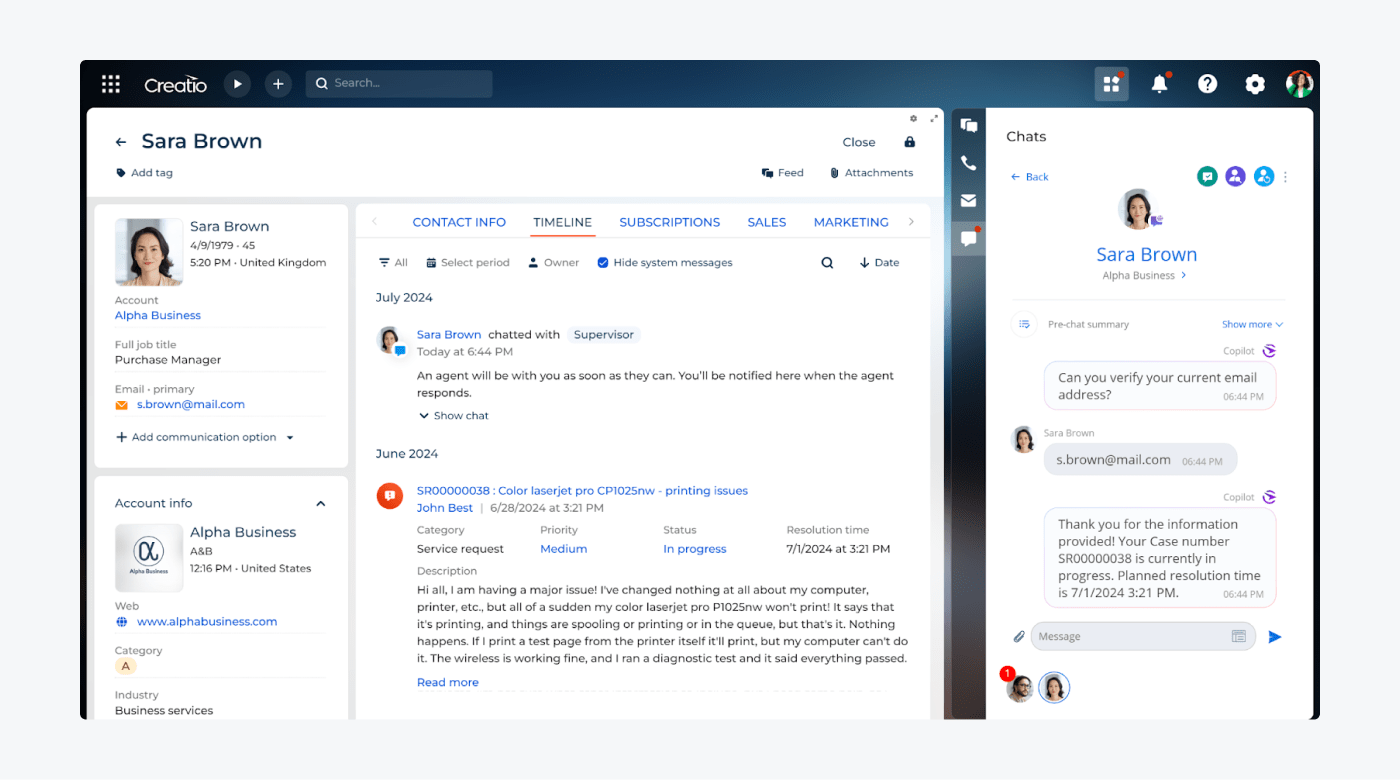
Rating: 4.6/5 ⭐️ (150+ G2 reviews)
Ada is an enterprise-focused AI platform that empowers large businesses to automate customer interactions at scale. Ada enables companies to build agentic systems for tasks like troubleshooting, account updates, and transaction processing. Its customization features support brand-specific service and consistent deployment across languages and channels with minimal manual effort. The platform also supports proactive support and is suited for enterprises needing flexible, secure, and scalable AI solutions.
Main features:
- No-code AI builder
- Omnichannel support (web, mobile, social apps)
- Personalized conversations using CRM and backend integrations
- Multilingual capabilities
- Advanced security and compliance for enterprises
- Custom enterprise pricing (typically starts at several thousand dollars per month based on usage and features)
- Tailored packages for deployment size and integration complexity
3. Intercom Fin
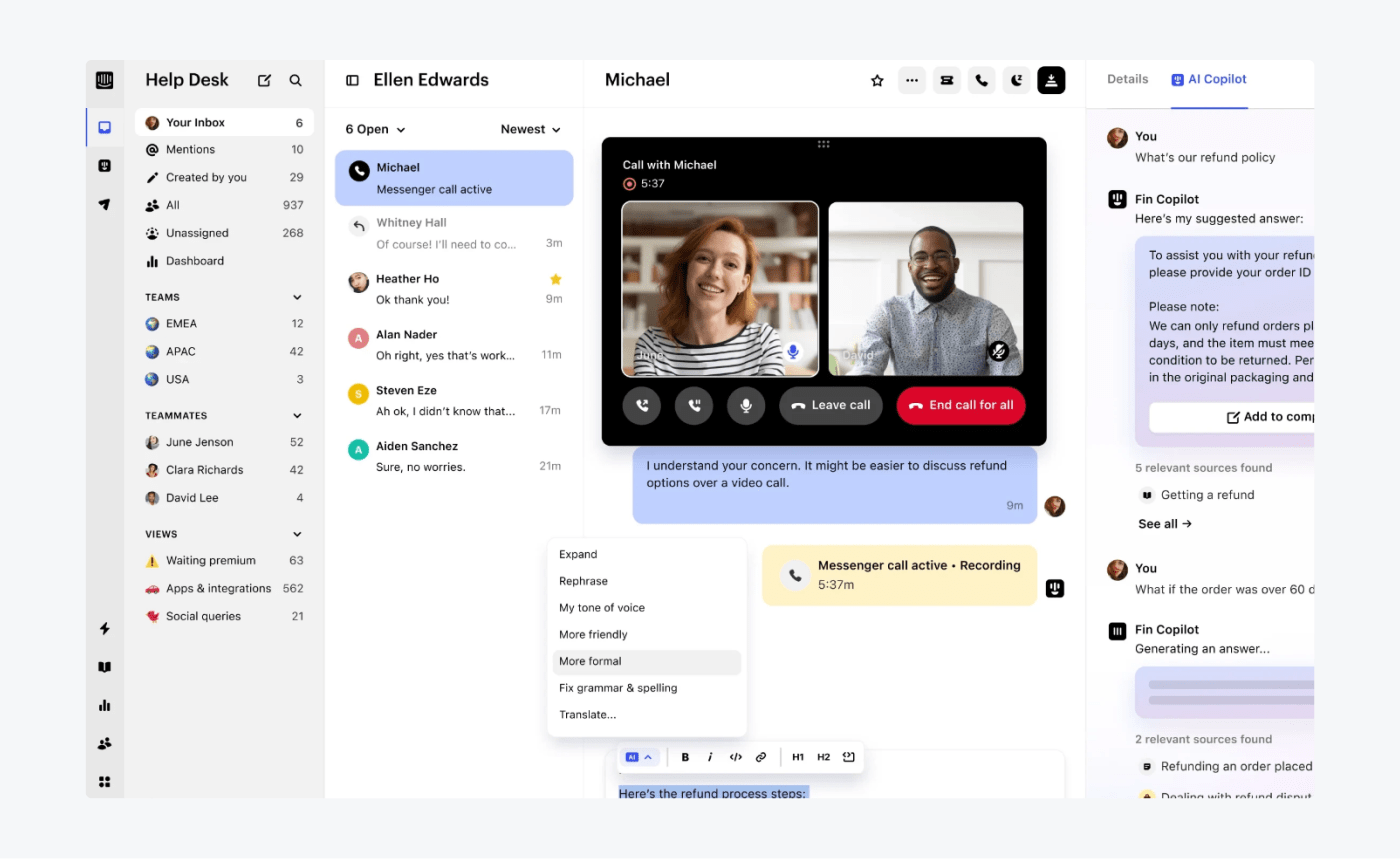
Rating: 4.6/5 ⭐️ (3000+ G2 reviews)
Intercom Fin is an AI-powered support tool optimized for product-led companies that want to automate customer interactions while keeping a deep connection to their products. Fin uses Intercom’s AI and large language models to deliver personalized, intelligent conversations. It’s a natural fit for companies already using Intercom for support, onboarding, and education.
Fin pulls info from your knowledge base and uses it smartly during chats. With deep integrations into ticketing, user data, and analytics, it’s ideal for scaling support in growing tech companies, especially those focused on self-serve and product-led strategies.
Main features:
- AI chatbot built on Intercom’s platform
- Deep knowledge base integration
- Smart handoffs to human agents
- Self-service customer support workflows
- Integrations with CRMs, analytics, and product tools
- Multilingual support
- Starting from $0.99 per AI resolution (pay-per-resolution model)
- Additional subscription costs for broader Intercom platform features
- Three basic models: Essential / Advanced / Expert, starting at $29 for Essential
4. Forethought
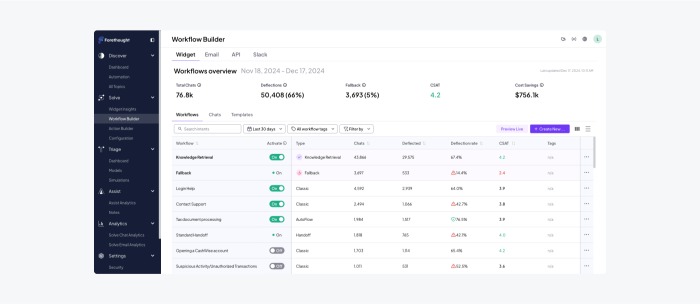
Rating: 4.3/5 ⭐️ (140+ G2 reviews)
Forethought positions itself as the pioneer in AI-first customer support, aiming to resolve issues before a human agent even gets involved. Its agentic AI capabilities include instant ticket triaging, auto-responses to repetitive questions, and predictive intelligence that guides users to solutions without waiting. Forethought automates every step of customer service—before, during, and after support. Its tools help reduce tickets, support agents, and speed up replies. This is great for busy support teams who need to work faster without lowering quality.
Main features:
- AI chatbots
- Automated ticket categorization
- Agent helper tool
- Predictive analytics
- Deep integration with Zendesk, Salesforce, and other support systems
- Custom pricing based on usage and company size
- Typically, enterprise-level budgets (starting at mid-five-figure annual contracts)
Read more: Learn best practices for Lyro AI training
5. Kore.ai
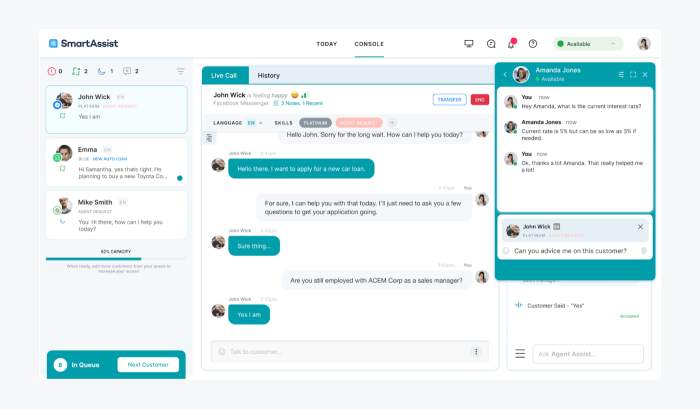
Rating: 4.7/5 ⭐️ (380+ G2 reviews)
Kore.ai is an advanced conversational AI platform that allows businesses to create custom AI virtual agents tailored for customer service, HR, IT helpdesk, and more. Kore.ai supports complex agentic workflows across channels like voice, messaging apps, websites, and IVR. It offers strong NLU, deep customization, and secure, large-scale deployment.
Companies needing multilingual and multichannel AI can use its pre-built templates or build custom solutions. The low-code platform helps non-technical teams get started quickly, while developers can still access advanced tools.
Main features:
- Low-code/no-code AI agent builder
- Voice and text AI capabilities
- Omnichannel deployment (web, mobile, IVR, messaging apps)
- Advanced NLU and multilingual support
- Analytics and reporting tools
- Enterprise-grade security and compliance
- Custom pricing based on deployment size and complexity
- Free trial available for the Kore.ai Experience Optimization (XO) platform
- $500 credit to get you started when you publish your first bot. It has Standard and Enterprise plans.
Read more: Discover which metrics are critical for chatbot analytics.
What are some real-world applications of agentic AI?
To truly understand the potential of agentic AI, it’s helpful to see it in action. The following real-world agentic AI use cases highlight how organizations leverage Tidio’s customer service automation tools and agentic AI.
They deploy it to solve both simple and complex problems, streamline operations, and drive innovation across industries. Here are three quick examples of the impact.
Gecko Hospitality cut lead response time by 85% with Tidio
Gecko Hospitality faced a familiar challenge: thousands of website visitors, but low engagement and poor lead conversion. The culprit? Slow email response times and no real-time interaction.
They added Tidio chatbots and live chat, improving their customer experience strategy and enabling instant communication with potential clients. With automated workflows and personalized responses, Gecko could qualify leads faster and provide around-the-clock support.
The impact was immediate, as Tidio’s client achieved the following benefits:
- Improved lead response time by 85%
- Increased website conversion rate by 100%
- Handled 1,500+ conversations monthly with just one chatbot
At present, about 90% of conversations are handled by Lyro, and in the vast majority of cases the responses have been perfect. These responses are audited daily to ensure that the correct responses and information is given. My biggest fear of AI hallucinations seems to have been unfounded, as even intentionally attempting to get Lyro to provide false information has been unsuccessful.

By automating initial outreach and offering live support, Gecko Hospitality significantly enhanced the candidate experience while freeing up time for its recruiters to focus on closing deals.
Read more: Check out the full Gecko Hospitality case study.
Tidio helped Endeksa double conversions via lead qualification automation
Endeksa, a property valuation platform, struggled with high bounce rates and lost leads due to slow and inefficient sales processes. Their challenge? Many users visited the site but never followed through to book demos, leaving sales reps overwhelmed with unqualified prospects.
Endeksa implemented Tidio’s Lyro AI agent as one of the best lead generation tools to streamline lead capture and improve efficiency. This allowed them to instantly engage visitors, qualify leads, and book meetings automatically, without needing a live agent.
The impact was immediate. Endeksa:
- Doubled their conversion rate
- Saved 4 hours per agent per day
- Booked 10–15 meetings daily via chatbot
We needed the most sustainable and efficient way to manage the traffic and improve customer satisfaction. So we implemented Tidio chatbot technology.

Endeksa automated lead qualification and reduced manual workloads. This freed up their sales team to focus on high-quality prospects, leading to better conversations, more conversions, and faster deal closures.
Read more: Check out the full Endeksa case study.
Cove increased monthly sales by 30% with a 24/7 AI assistant
Cove, a U.S.-based home security brand, was looking for ways to reduce customer service load and recover sales from undecided shoppers. Their existing customer support setup couldn’t keep up with growing demand.
To improve engagement, Cove integrated Tidio’s AI agent Lyro into their website. This enabled them to offer round-the-clock support, instantly answering customer queries and resolving objections in real time.
The impact was immediate. With Lyro, Cove:
- Reduced workload by 70%
- Increased online sales by 30% in just 3 months
- Improved customer experience by providing instant, reliable answers
We looked at other AI chatbot options, but Tidio stood out. While competitors estimated month-long timelines, Tidio could be fully operational within hours.

By automating responses and supporting buyers at key decision points, Cove turned its website into a self-serve sales tool. The result was faster resolutions, happier customers, and a major lift in revenue via live chat for sales.
Read more: Check out the full Cove case study.
Why agentic AI isn’t just a “nice-to-have” anymore
Customer expectations have changed. Fast responses aren’t enough. People want smart, proactive engagement. And your competitors? They’re already making the shift.
Here’s why agentic AI is the next big move and not just buzzword fluff:
- Traditional AI-scaled support, but it’s hitting limits.
- Agentic AI goes further: it can run entire CS and help desk workflows, not just answer questions.
- That means happier customers and lower support costs.
- It’s a competitive edge you can deploy now, not “someday.”
The best way to start?
Implement Tidio’s agentic AI
You don’t need to launch a full-scale AI transformation on day one. Start small. Prove the value. Scale fast. This isn’t a pilot project anymore. Smart companies are already building full CX strategies around agentic AI.
And not all bots are built the same. Here’s what to look for:
- Deep integrations with your existing stack (think CRM, ERP, CX tools)
- Scalability and easy integration because the tool should grow with your customer journey
- Learning loops to get smarter over time (not just rule-based logic)
Tidio checks all these boxes:
- It integrates with the most widely used platforms like Intercom, Zendesk, Salesforce, etc.
- Tidio scales with you and has a zero-code implementation.
- Our AI experts will help you build and improve every step of the way.
Want help picking the right starting point for your team? Let’s talk strategy.
Scale your business with efficient customer support
Tidio is an all-in-one customer service platform that combines live chat, AI chatbots, and ticketing features. It allows businesses to automate replies to common questions instantly and manage support more efficiently.
Yes, it does. Tidio uses artificial intelligence to make customer interactions faster and more efficient. Its AI agent, Lyro, understands natural language and can provide accurate answers automatically.
Yes. Tidio includes both traditional rule-based chatbots and Lyro, an AI-powered chatbot. You can create your automated flows using the ready-made templates or let Lyro respond to FAQs with information from your website or help articles.
Tidio offers flexible pricing, starting with a free plan and paid plans from $29 per month. The exact cost depends on your selected features and usage. Companies using Lyro report strong ROI thanks to reduced workload and faster responses. With a 67% average resolution rate, Lyro helps lower costs, and boost overall support efficiency.

